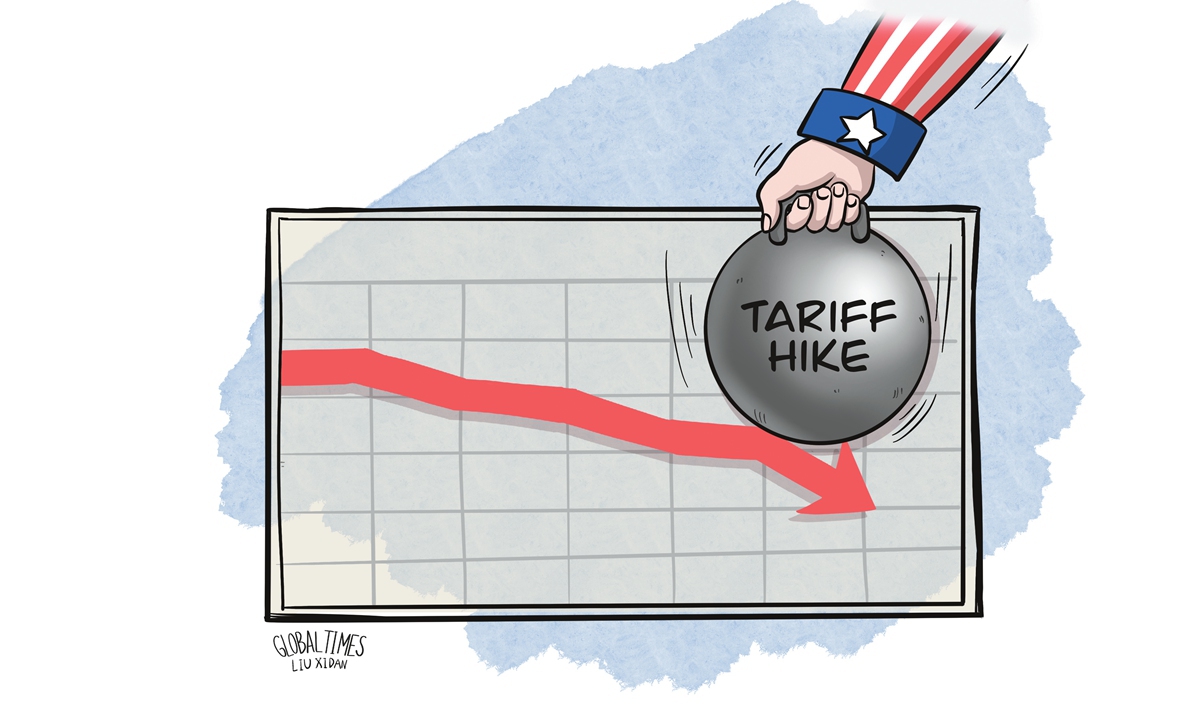
Illustration: Liu Xidan/GT
A recent CNBC article spotlighted growing concern among investors regarding a potential exodus from US assets, as both US Treasury debt and the dollar experience a downturn. The April sell-off in financial markets has been wider and more volatile than typical pullbacks, fueling concern that the aggressive and constantly changing trade policy from Washington could be doing long-term damage to the financial standing of the US, the report said.
Economic theory suggests that an increase in tariffs usually leads to an appreciation of the domestic currency. However, the situation unfolding in the US is currently the opposite. On Friday, the dollar fell by more than 1 percent relative to a basket of other currencies to reach its lowest level in three years, compounding an almost 10 percent slide since the start of the year, The Guardian reported.
This unusual trend prompts the question: Why is this happening? Some analysts believe that the dollar has weakened more than other currencies because investors believe the US economy is more at risk from the tariffs than other major countries. As the economy weakens, so too does the dollar's value, driven by a diminished overall demand for the currency.
Meanwhile, in the usually stable government bond market, the yield on the 10-year Treasury note experienced an uptick on Friday, contributing to its weekly increase. A bond's yield moves in the opposite direction to its price. So, as yields have been rising unexpectedly, investors are seeing the value of their holdings decline. According to The New York Times, the Treasury market's erratic behavior has raised fears that investors are turning against US assets.
Some dollar-denominated assets are under pressure as Washington's tariff policies cause widespread uncertainty, eroding investor confidence. This can be viewed as yet another instance where tariff policies are adversely affecting the US economy. It's somewhat ironic that Washington's tariff strategy - without any evidence yet of success in mitigating the US trade deficit - has already begun to manifest adverse effects in the financial markets, notably impacting dollar-denominated assets.
In recent days, the market has been full of talk about whether dollar-denominated assets, especially the dollar itself and US Treasury debt, have lost their status as safe havens and are now considered risk assets. Whether this shift has truly happened or not, this debate itself highlights a growing lack of confidence in dollar-denominated assets. The economic uncertainty, fueled by Washington's tariff policies, is being translated into financial market uncertainty, undermining the US economy itself.
For a long time, certain dollar-denominated assets have served as a global safe haven, delivering substantial benefits to the US economy. If global investors' confidence in these assets wanes, even slightly, it could precipitate tangible losses for the US economy, leading to capital flight.
Undoubtedly, the US plays a pivotal role in the global financial markets. If the current public discourse questioning the safe-haven status of the dollar and US Treasury debt marks a new starting point for declining confidence in these assets, and if this trend persists, the transition of dollar-denominated assets from safe havens to risk assets - though potentially a process of variable duration - will profoundly affect the global financial system. This shift is poised to introduce many uncertainties into the global economy and financial markets, reshaping the landscape in significant ways.
On Wednesday, the US government announced a 90-day pause on certain new tariffs. However, the fluctuations and uncertainties in US tariff policy will continue to have severe implications for the international economy, impacting countries and global financial markets in diverse ways.
Amid the uncertainty sparked by US tariff policies, the global economy needs to remain vigilant to the potential ripple effects of a possible reevaluation of dollar-denominated assets. As confidence in the dollar and US Treasury debt wanes, prompting a shift in the international financial landscape, multilateral and mutually beneficial financial cooperation becomes crucial in mitigating the uncertainties this transformation may bring.




